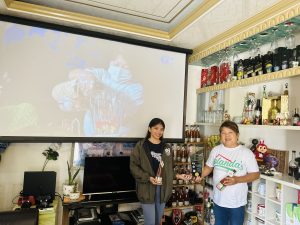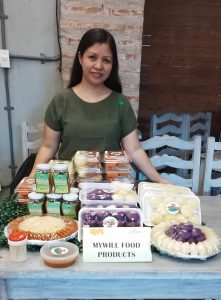
Lumban is a town renowned for its centuries-old craftsmanship of hand embroidery. Considered as the Embroidery Capital of the Philippines, Lumban has been home to skilled artisans and a destination for exquisite hand-embroidered works. Lumban’s embroiderers create unique and intricate designs through their skillful handling of thread and needle. The captivating stories woven into the threads of the embroidery showed the resilience, pride, and the commitment of the people of Lumban to preserve their heritage through this ancient craft.
One skilled artisan, dedicatedly preserving and innovating this timeless form of art, is Narcisa Trillana Noble. Ms. Noble, the founder of FashioNoble, started the business in the year 2000. The business name FashioNoble was suggested to Ms. Noble by her long-time customer to incorporate the word “Fashion” and her surname “Noble” to help them build their brand and establish their own identity. Prior to this, they used the typical business name “Gowns, Barong, Lumban Embroidery, atbp.”
Ms. Noble’s love for the craft, her endurance as well as her sense of family, is unwavering. FashioNoble was inspired from the dream of this loving mother to provide for her children’s education and give them a good life in the future. It is a family-owned business with over 20 years of experience committed to uphold the tradition of embroidery making in Lumban. FashioNoble showcased a story of strength, passion, patience and resilience. The brand strives to make the finest quality of our national costume, Barong Tagalog and Filipiniana, which are also functional and affordable. Each product is the result of collective hand skills comprising of embroidery, painting, bead works and sewing.
Lumban’s embroidery often took influence from nature, culture, and folklore. Floral motifs, animals, and geometric shapes are often featured, with each design having its unique story and deep cultural significance. Hand embroidering is undeniably a tedious work, requiring concentration and patience. A design needs to be transferred first from paper to cloth by perforating the paper using a pen with washable ink. Next, the design will be stamped on the cloth, then traced with a pencil. The cloth will be stretched using a tambor, two bamboo hoops with the size of regular plates. Afterwards, it will be ready for embroidering by hand using known traditional stitches. Two techniques can be used in hand embroidery. One is the “calado” technique, characterized by delicate cutwork, while the other is called “punto de taas” characterized by adding dimensions to the embroidery. After embroidering, the men would stretch out the piece of cloth on a large rectangular bamboo frame called “bastidor”. It will then be washed with detergent and water before letting it dry in the sun.
The tradition of hand embroidery has been passed on to generations, and Ms. Noble is no exception. Her son, Mike Ryan Trillana Noble, took over the business and officially registered FashioNoble Barong Tagalog at Pasalubong with the Department of Trade and Industry (DTI) on December 7, 2021. Also in the same year, the business was enrolled at the One Town, One Product Program of DTI Laguna that paved way for enhancing their logo design and packaging. At present, they sell traditional and modern barong Tagalog (composing of “Raya”, full open and half-open “pechera”, piña Tagalog, boys’ barong tagalog, and coat barong), gowns and women’s clothing fabrics that are ready-to-made and custom-made (including ladies’ barong, classic style, full gown, mestizo dress, kimona blouse and long skirts); hand and machined embroidered; and dyed fabrics. The traditional design has been enhanced by ethnic patterns, colors, sequins or crystals to give them a fresh look. The intricate designs are carefully defined, while the backside of the pieces is perfectly smooth and pristine. Additionally, the pieces are adorned with a “calado” pattern, created by unraveling the threads of the cloth to form a delicate, net-like effect. Their products are made of piña jusi, piña silk, piña original, cocoon silk, organza and the like. They also sell shawls and bags made of piña, jusi, cocoon and chiffon fabric.
Due to the COVID-19 pandemic, FashioNoble closed their shop but decided to continue their production process. They said that the Internet helped expand their customer base. They uploaded photos of their products on social media (Facebook Page) and used e-commerce platforms (Lazada and Shopee), enabling customers from around the country and abroad to easily browse them, select a product, remit payment and have them shipped. Their employees were on a work from home set-up to enable them to earn while keeping them safe during the pandemic.
DTI Laguna provided extension services and support to FashioNoble to introduce their brand and products to a wider market by various local and national trade fairs participation. The owner also started attending free webinars offered by DTI Laguna. According to him, the webinars were very informative and greatly helped both the business and him as a new business owner.
At the same time, the local government of Lumban shows their support to local embroidery shops by conducting workshops and training programs, to ensure that this traditional art is passed down to future generations. The annual embroidery festival in Lumban was also created to celebrate the craftsmanship of the artisans and draws visitors from all over the country.
FashioNoble is currently working on innovative designs and patterns to adapt to the ever-changing world of fashion. From the usual floral patterns, they are now incorporating modern symbols, abstract designs, and bolder colors. They are already looking at a bigger picture and aim to target a broader market by introducing their products with modern designs to the younger generations.
Local embroidery shops have been providing livelihood to generations of families in the town of Lumban. This serves as an inspiration and goal to FashioNoble to open another branch in the future to provide income opportunities not only to the residents of Lumban but also to the locals residing at nearby towns. They aim to work hard and make their business successful here and abroad. They aspire to educate our countrymen about the embroidery industry and encourage them to also start their own businesses.
When asked about his advice toward aspiring entrepreneurs, Mr. Noble said: “Pag-isipan nila kung ano ang negosyong gusto nila at pag-aralan nila ang pasikot-sikot nito para ito umunlad. Kung marunong ka ng negosyo mo, iwan ka man ng mga tauhan mo, tuloy ang takbo nito kasi marunong ka. Maging matalino, masipag, matiyaga at masinop.” ♦
Date of Release: 17 November 2023






